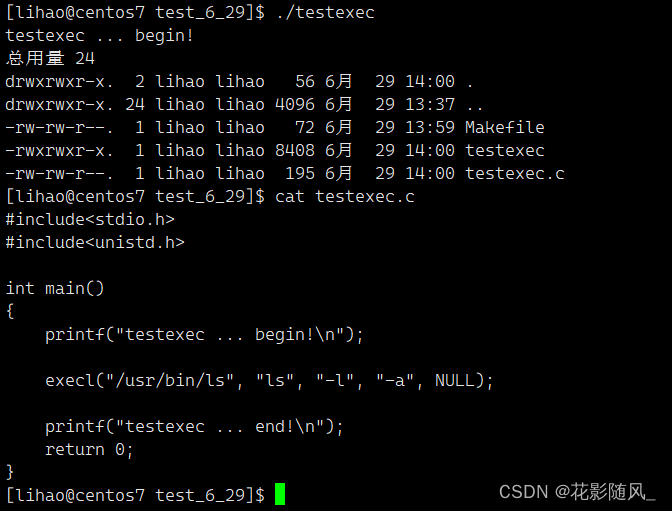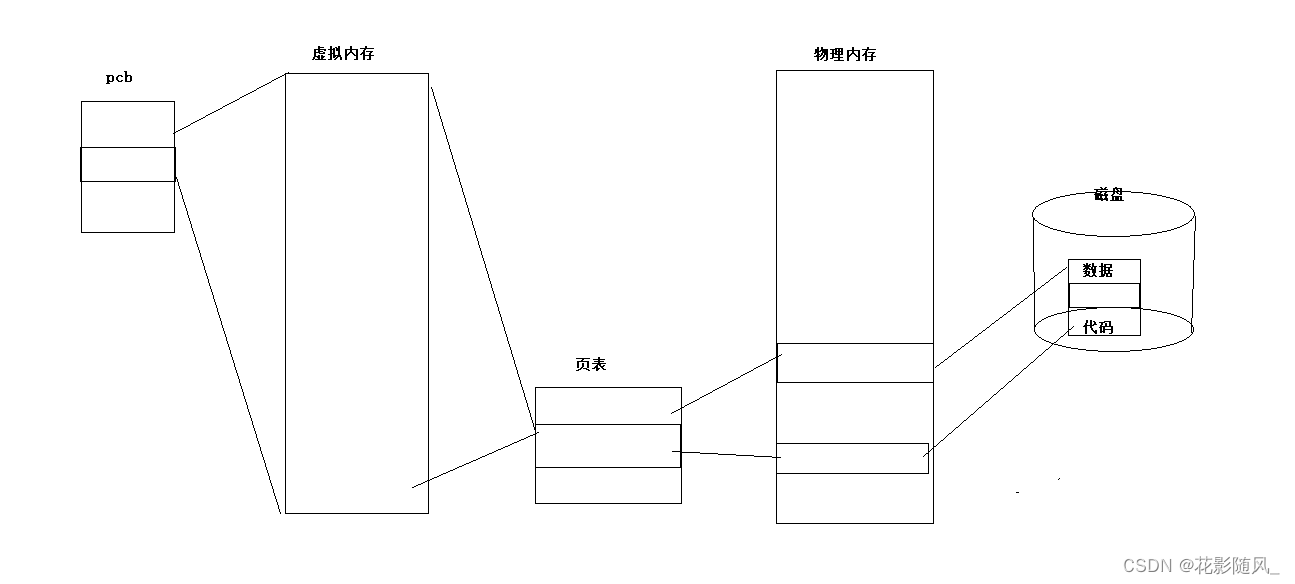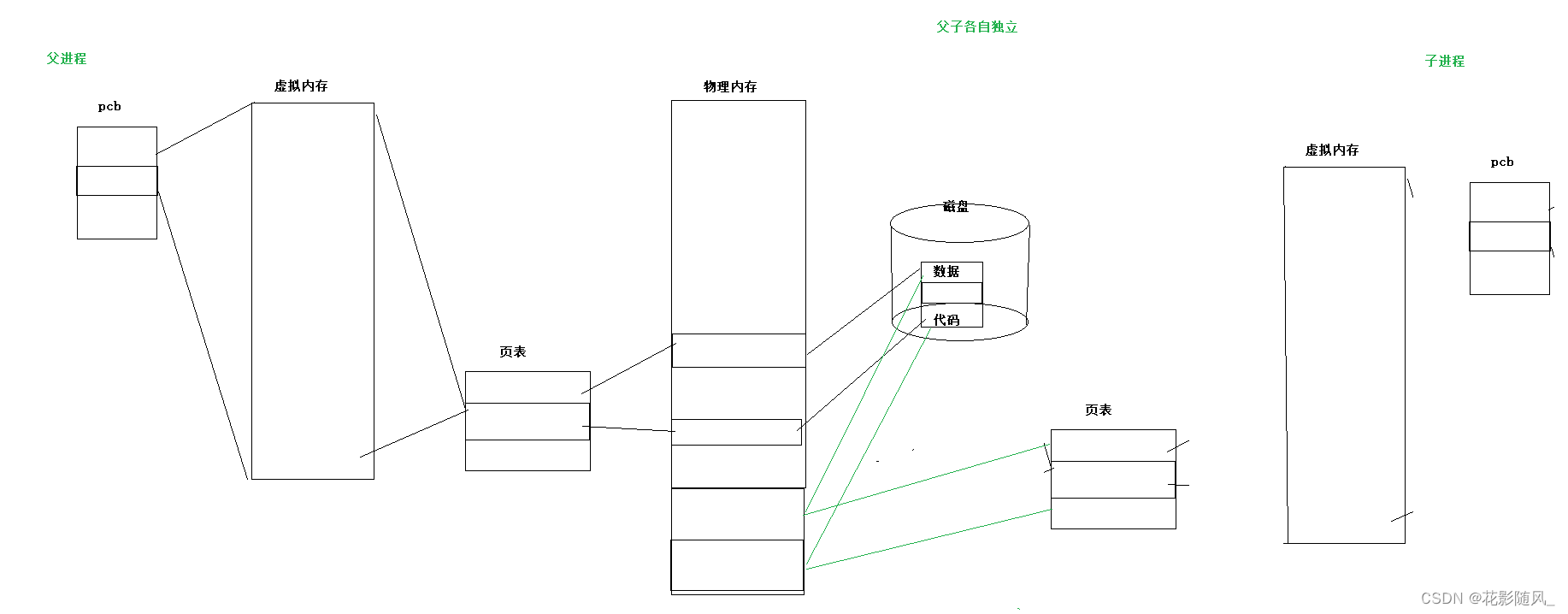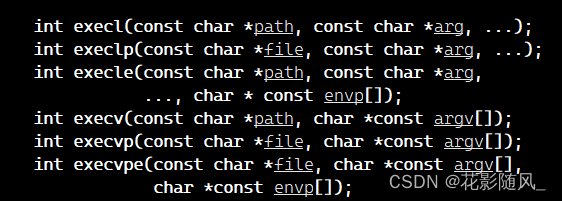1.先看代码 && 现象

我们用exec*函数执行新的程序,
exec*系列的函数,执行完毕后,后续的代码不见了,因为被替换了。
execl的返回值可以不关心了,只要替换成功,就不会向后继续运行,只要继续运行了,一定是替换失败了!

2.解释原理

进程 = 内核数据结构 + 代码数据
进程的程序替换,有没有创建新的进程?? 没有的
站在被替换进程的角度:本质就是这个程序被加载到内存了!
怎么加载?exec*类似于Linux上的加载函数
3.将代码改成多进程版
fork创建子进程,让子进程自己去替换,wait等待
创建子进程,让子进程完成任务:
- 让子进程执行父进程代码的一部分
- 让子进程执行一个全新的程序

4.使用所有的替换方法,并且认识函数参数的含义
下面我们查的是这些替换方法,用man 3 execl
3手册是c语言的标准库GNU标准,所以我们实际查的是几个内含系统调用的c语言函数。

这是6个exec*系列函数。

第一个execl函数:
path:我们要执行的程序,需要带路径(怎么找到程序你得告诉我)
exec后面的l -- list:就是要存放的选项列表,在命令行中怎么执行,你就怎么传参!ls -a -l
execl("/usr/bin/ls", "ls", "-a", "-l", NULL);
路径代表你想执行谁,选项代表你想怎么执行!!!
带l的是我们要传入一个列表选项,那么带v的呢?

v:有动态数组的意思。
明显是要我们传入一个数组,这个数组就包含我们想要的选项,

带p的exec函数:
用户可以不传要执行的文件的路径(但是文件名要传),直接告诉exec*,我要执行谁就行
p:查找这个程序,系统会自动在环境变量PATH中进行查找。

e:environment环境变量。
envp[]:整体替换所有的环境变量!
- 用全新的给子进程。
- 用老的环境变量给子进程,environ。
- 老的环境变量稍微修改,给子进程。
上面的程序替换 ,我们替换的都是系统命令,可不可以替换我们自己写的程序呢?
支持不同的应用场景!!!
当然可以。 而且可以替换用任何语言写的无论是c++,java,python等语言都可进行替换,替换之后原程序pid不会改变,创建的子进程也不会改变,因为进程的替换,只是代码和数据的替换,不影响原程序的pcb。
系统调用接口execve。

上面的函数最终都将会走到系统调用接口。
5.写一个自己的Shell(简易版)
cpp
#include<stdio.h>
#include<stdlib.h>
#include<string.h>
#include<ctype.h>
#include<unistd.h>
#include<errno.h>
#include<sys/types.h>
#include<sys/wait.h>
#define SIZE 512
#define ZERO '\0'
#define SEP " "
#define NUM 32
#define SkipPath(p) do{p += (strlen(p)-1);while(*p != '/')--p;}while(0)
char cwd[SIZE * 2];
char* gArgv[NUM];
int lastcode = 0;
void Die()
{
exit(1);
}
const char* GetHome()
{
const char* home = getenv("HOME");
if(home == NULL) return "None";
return home;
}
const char* GetUserName()
{
const char* username = getenv("USER");
if(username == NULL) return "None";
return username;
}
const char* GetHostName()
{
const char* hostname = getenv("HOSTNAME");
if(hostname == NULL) return "None";
return hostname;
}
const char* GetCwd()
{
const char* cwd = getenv("PWD");
if(cwd == NULL) return "None";
return cwd;
}
//commandline:output
void MakeCommandLineAndPrint()
{
char line[SIZE];
const char* username = GetUserName();
const char* hostname = GetHostName();
const char* cwd = GetCwd();
const char* GetCwd()
{
const char* cwd = getenv("PWD");
if(cwd == NULL) return "None";
return cwd;
}
//commandline:output
void MakeCommandLineAndPrint()
{
char line[SIZE];
const char* username = GetUserName();
const char* hostname = GetHostName();
const char* cwd = GetCwd();
SkipPath(cwd);
snprintf(line, sizeof(line), "[%s@%s %s]>", username, hostname, strlen(cwd) == 1 ? "/" : cwd + 1);
printf("%s", line);
fflush(stdout);
}
int GetUserCommand(char command[], size_t n)
{
char* s = fgets(command, n, stdin);
if(s == NULL) return -1;
command[strlen(command) - 1] = ZERO;
return strlen(command);
}
void SplitCommand(char command[], size_t n)
{
(void)n;
//"ls -a -l" -> "ls", "-a", "-l"
gArgv[0] = strtok(command, SEP);
int index = 1;
while((gArgv[index] = strtok(NULL, SEP)))index++;// done, 故意写成=,表示先赋值,在判断,分割之后,strtok会返回NULL,刚好让gArgv最后一个元素是NULL,并且while判断结束
}
void ExecuteCommand()
{
pid_t id = fork();
if(id < 0) Die();
else if(id == 0)
{
//child
execvp(gArgv[0], gArgv);
exit(errno);
}
else
{
//father
int status = 0;
pid_t rid = waitpid(id, &status, 0);
if(rid > 0)
{
lastcode = WEXITSTATUS(status);
if(lastcode != 0) printf("%s:%s:%d\n", gArgv[0], strerror(lastcode), lastcode);
}
}
}
void Cd()
{
const char* path = gArgv[1];
if(path == NULL) path = GetHome();
//path一定存在
chdir(path);
//刷新环境变量
char temp[SIZE * 2];
getcwd(temp, sizeof(temp));
snprintf(cwd, sizeof(cwd), "PWD=%s", temp);
putenv(cwd);//ok
}
int CheckBuildin()
{
int yes = 0;
const char* enter_cmd = gArgv[0];
if(strcmp(enter_cmd, "cd") == 0)
{
yes = 1;
Cd();
}
else if(strcmp(enter_cmd, "echo") == 0 && strcmp(gArgv[1], "$?") == 0)
{
yes = 1;
printf("%d\n", lastcode);
lastcode = 0;
}
return yes;
}
int main()
{
int quit = 0;
while(!quit)
{
//1.我们需要输出一个命令行
MakeCommandLineAndPrint();
//2.获取用户命令行字符串
char usercommand[SIZE];
int n = GetUserCommand(usercommand, sizeof(usercommand));
if(n <= 0) return 1;
//3.命令行字符串分割
SplitCommand(usercommand, sizeof(usercommand));
//4.检测命令是否是内键命令
n = CheckBuildin();
if(n) continue;
//5,执行命令
ExecuteCommand();
}
return 0;
}